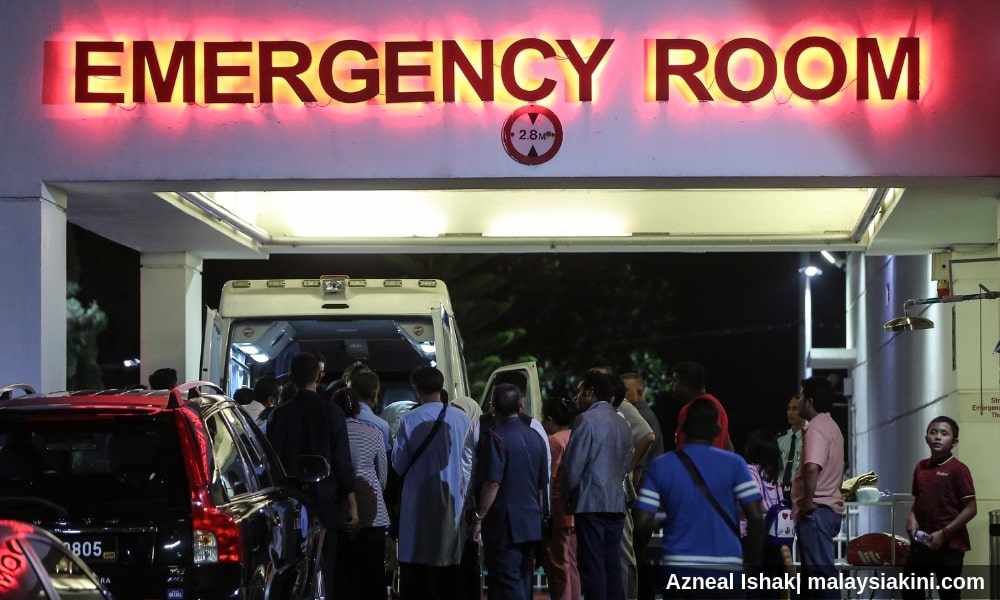MP SPEAKS | The recent reports of bullying and sexual harassment raise worrying toxic working conditions in our healthcare system.
Young doctors are ostensibly not getting the protections they need. Given the tragic loss of lives and the litany of reports bandied in social media, more needs to be done, urgently.
As soon as I helmed the Ministry of Health under the Pakatan Harapan government, these issues, being emotive and perennial, garnered attention. We coined the term “Junior Doctors' Quandaries” when we first undertook to address the problems faced by House Officers (HOs).
I told a Post-Cabinet Meeting in MOH in the early days that we shall get to the bottom of this. We needed a deterrent approach for would-be perpetrators and set in place a process for cases.
We worked to create a climate where young doctors could speak out. We visited three major hospitals, namely Queen Elizabeth Hospital in Kota Kinabalu, the Selayang Hospital and the Sultanah Hospital in Johor Bahru, and had separate engagements or town hall-like sessions with the groupings of HOs, MOs and top management members, specialists, etc.
An opportunity came about when a very serious case of bullying and harassment involving a senior head of department (HOD) at a major specialist hospital was raised.
Culture of fear permeates the entire system
Only then did l suddenly realise how difficult it was to bring a culprit to book. Firstly, we undertook a preliminary finding and with ‘prima facie evidence’ established, we later instituted a Full Inquiry Committee of very abled, experienced senior staff of the MOH, like the heads of services, etc. After a concerted attempt, the Yang di-Pertuan Agong had to finally terminate the culprit’s service in the Health Ministry.

Arguably, there is a culture of fear that permeates the entire system. Part of this is arguably set by the MOH’s top brass, which has repeatedly reprimanded officers for speaking out and raising concerns.
Admittedly it is also systemic, as junior doctors are vulnerable to those in more senior positions who have sweeping powers to control career paths.
And for junior doctors:
1. Their career path (in government service) depends heavily on their yearly appraisal (scored by their immediate superiors);
2. Fear of not getting a permanent position (many are on contract);
3. Fear of not being selected to undergo Master’s training; and
4. Fear of being transferred out of their current place of work or being denied entry to a place of training of their choice.
Many MOH staff are working in fear. Those in senior positions may not agree or like to hear this, but this is the hard truth. Period. Testimonies by those that have retired sufficed as evidence.

Rather than dismissing the ongoing criticisms and reports, now is the time for the Ministry of Health to take action. The followings are some observations and guidelines that can work to address the problematic issues.
1. There should be a zero-tolerance policy on workplace bullying, harassment and intimidation. Be brave and undertake the appropriate actions as per the SOP without fear or favour. The grievances and complaints of the junior staff must be addressed promptly, sensitively and their identities protected jealously. Reinstate processes that allow junior officers to report on their senior officers, without punishment.
2. Establish a Full Inquiry Committee to review the scope of the issues across the entire health sector.
3. Recognise that no system is foolproof. Be humble and be prepared to rectify the faults within the system. Not all faults can be fixed in one go, hence requiring continuous work and improvement.
4. In all fairness, the problem is not one-sided. Senior doctors, too, face challenges from some problematic HODs and HOs. These need equal attention too. So arguably, processes put in place need to be at multiple focal points.
5. The Terms of References (TOR) and Standard Operating Procedures (SOP) of a healthy work culture must not be limited to only hospitals but applicable to the entire MOH. Also, it should not only cover junior doctors but all levels of staff. Toxic work cultures can exist even in the offices at the headquarters of the MOH in Putrajaya and even at their respective state and district health departments.
6. Leverage the ‘Let's TALK Minda Sihat’ programme, which MOH relentlessly championed to address mental health well-being among the population. It is crucial that the MOH ensures that its own staff are first able to live and benefit from the objectives of that programme.
7. Finally, the buck stops at those highest in office, the minister, the director-general, the state directors and the HODs. As poignantly alluded to by a former senior officer in the MOH. “…appropriate work culture must be championed by all Hospital Directors and HODs on the ground”.

Many tend to remain silent, even when it’s occurring blatantly. It often starts from the top - and the solution will also come from the top
Those at the top need to take a hard look at how they have contributed to the toxic work conditions and work to address these issues.
Trials by the media and social media will only cease or be minimised if the due processes are being done and seen as done fairly and justly. These issues cannot be allowed to continue to fester and worsen.
The solution is in your hands and you have nothing to fear if you are doing your work fairly and righteously.
Those in the health sector have to set an example and assure a healthy work environment, not just for junior doctors, but for all Malaysians.
DZULKEFLY AHMAD is the MP of Kuala Selangor and Pakatan Harapan’s Health Committee chairperson.
The views expressed here are those of the author/contributor and do not necessarily represent the views of Malaysiakini.

